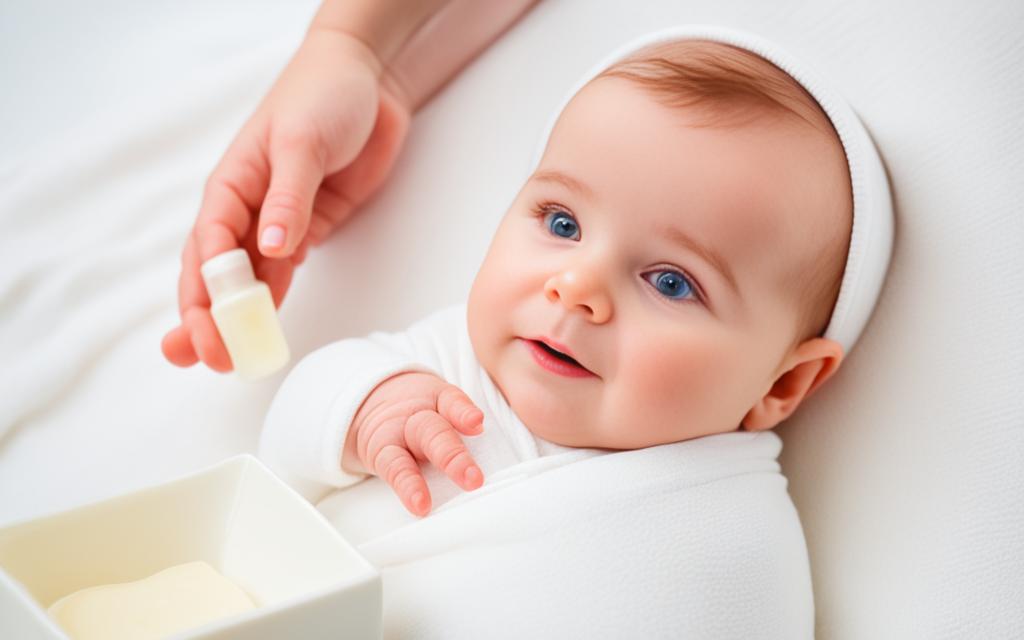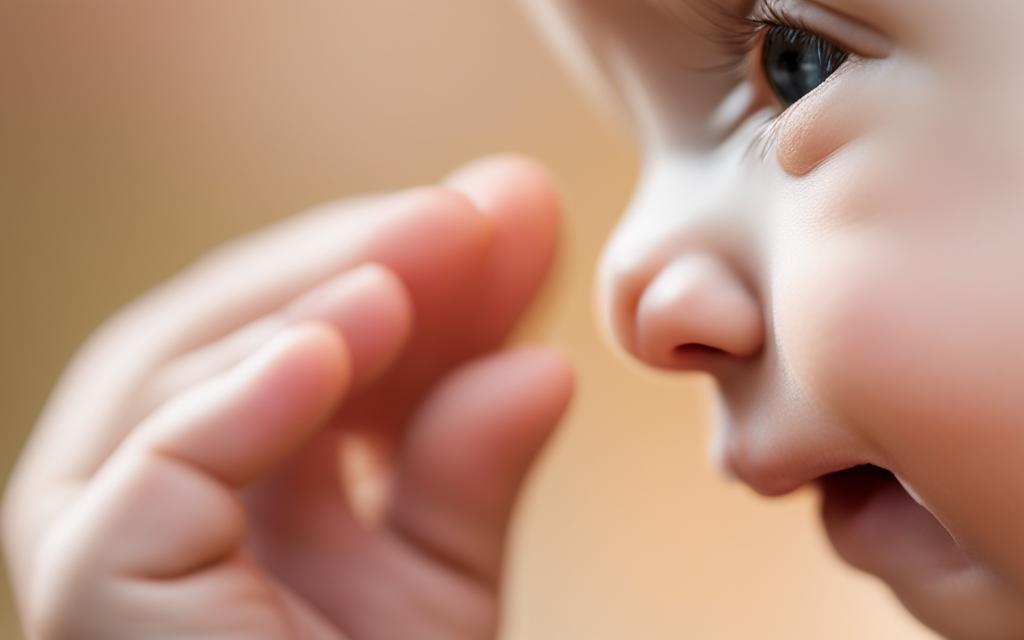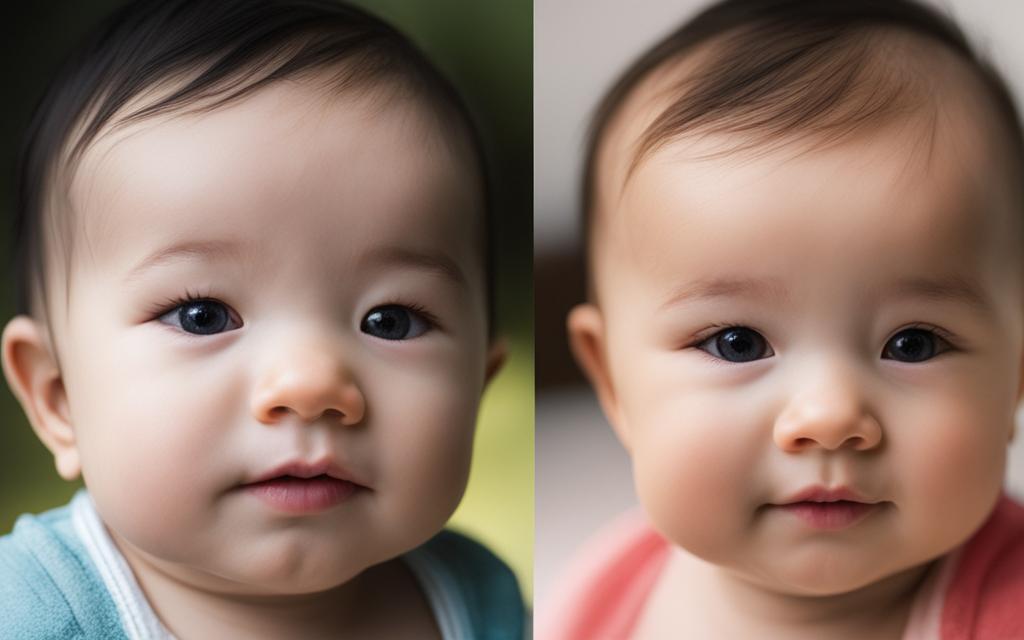Welcome to our informative guide on baby eczema versus acne! As a parent, it’s crucial to understand the differences between these common baby skin conditions to ensure proper care for your little one. In this section, we will explore the key characteristics of baby eczema and acne, providing you with insights into infant dermatology.
While both baby eczema and baby acne can cause rashes and skin irritations, they have distinct features and require different approaches for management. By familiarizing yourself with the symptoms and treatment options for each condition, you’ll be better equipped to care for your baby’s delicate skin.
Key Takeaways:
- Baby eczema and acne are common skin conditions that can affect infants.
- Baby eczema is characterized by dry, itchy, and inflamed patches of skin, while baby acne typically appears as small red bumps on the face.
- Seeking professional advice from a pediatric dermatologist is vital when dealing with baby skin conditions.
- Preventive measures and good skincare practices can help maintain your baby’s skin health.
- Understanding the differences between baby eczema and acne is crucial for providing appropriate care and treatment.
Understanding Baby Eczema
Baby eczema is a common skin condition that affects many infants. It is characterized by red, irritated, and itchy patches of skin that can cause discomfort for your little one. Understanding the causes and symptoms of baby eczema is essential in providing the right care and finding effective remedies. In this section, we will delve into the world of baby eczema, explore its causes and symptoms, and discuss available remedies to help manage this condition.
The Causes of Baby Eczema
Baby eczema can have various causes, including genetic predisposition, environmental factors, and allergens. Family history plays a significant role, as children with parents or siblings who have eczema are more likely to develop it as well. Environmental triggers such as dry or cold weather, irritants in skincare products, and excessive heat can also contribute to flare-ups.
Symptoms of Baby Eczema
The symptoms of baby eczema can vary, but common signs include red, scaly, and inflamed skin. Itchy patches, rough bumps, and oozing or crusting may also accompany the condition. These symptoms can appear on the face, scalp, behind the ears, wrists, and ankles. It’s crucial to recognize these signs early on to provide prompt treatment and relief for your little one.
Remedies for Baby Eczema
Managing baby eczema requires a multi-faceted approach. While there is no cure, several remedies can help alleviate symptoms and improve your baby’s comfort. Here are some effective remedies for baby eczema:
- Keep your baby’s skin moisturized using gentle, fragrance-free emollients.
- Use mild and hypoallergenic bath products to avoid further irritation.
- Identify and avoid potential triggers such as allergens or irritants in clothing or fabrics.
- Ensure your baby’s nails are trimmed to prevent scratching and skin damage.
- Consult a pediatrician or dermatologist for prescription creams or medications if necessary.
- Implement a regular skincare routine that includes gentle cleansing and moisturizing.
Maintaining Healthy Infant Skin
Preventing and managing baby eczema also involves maintaining overall healthy skin. Here are some tips to help you keep your baby’s skin in optimal condition:
- Choose clothing made of soft, breathable fabrics like cotton.
- Avoid overdressing your baby and keep the room temperature comfortable.
- Be mindful of using fragrance-free, gentle laundry detergents and fabric softeners.
- Avoid exposing your baby to extreme temperatures, both hot and cold.
- Implement a regular skincare routine, including gentle bathing and thorough but gentle drying.
By following these remedies and maintaining a healthy skincare routine, you can help your baby manage eczema and promote healthy, comfortable skin.
Exploring Baby Acne
Baby acne is a common skin condition that affects many infants. Although it can be concerning for parents, it is usually harmless and tends to resolve on its own within a few weeks or months. Understanding the causes, symptoms, and appropriate treatment options for baby acne can help parents navigate through this temporary condition and provide the best care for their little ones.
Causes of Baby Acne
The exact cause of baby acne is not known, but it is believed to be related to hormonal changes that occur in newborns. These hormonal fluctuations can stimulate the oil glands in the baby’s skin, leading to the development of acne-like bumps. It is important to note that baby acne is not caused by poor hygiene or exposure to allergens.
Symptoms of Baby Acne
Baby acne typically appears as small red or white bumps on the baby’s face, particularly on the cheeks, nose, and forehead. These bumps may be accompanied by redness or inflammation. Unlike adult acne, baby acne does not usually present with blackheads or whiteheads. The presence of these symptoms, along with the age of the baby, can help differentiate baby acne from other skin conditions.
Treatment Options for Baby Acne
- Gentle Cleansing: To manage baby acne, it is important to keep the affected areas clean. Gently cleanse the baby’s face with a mild, fragrance-free cleanser, using your hands or a soft cloth. Avoid scrubbing or using harsh products, as these may worsen the condition.
- Avoid Oil-based Products: Avoid using oily creams, lotions, or oils on your baby’s face, as they can clog the pores and exacerbate the acne. Opt for non-comedogenic products that are specifically designed for newborns.
- Patience and Time: In most cases, baby acne will resolve on its own without any treatment. It is important to be patient and give it time to clear up. Avoid using over-the-counter acne medications or home remedies without consulting a pediatrician, as these may be too harsh for your baby’s delicate skin.
It is important to remember that baby acne is a temporary condition and does not require intensive treatment. However, if you notice any unusual symptoms or if the acne remains persistent or worsens, it is recommended to consult a pediatrician or dermatologist for further evaluation.
Now, let’s take a look at a visual representation of the causes, symptoms, and treatment options for baby acne:
| Causes | Symptoms | Treatment |
|---|---|---|
| Hormonal changes in newborns | Small red or white bumps on the face | Gentle cleansing, avoiding oil-based products, patience |
By understanding the causes, recognizing the symptoms, and adopting appropriate treatment measures, parents can effectively manage baby acne and ensure the well-being of their newborn’s delicate skin.
Differentiating the Symptoms
When it comes to baby skin conditions, it’s important for parents to be able to differentiate between baby eczema and baby acne. While both conditions can cause rashes and discomfort, understanding their specific symptoms can help parents provide the appropriate care.
Baby Eczema Symptoms
Also known as atopic dermatitis, baby eczema is a chronic condition characterized by inflamed and irritated skin. Here are some common symptoms to look out for:
- Red, dry, and itchy patches: Babies with eczema often develop red, scaly patches of skin that can be itchy and uncomfortable.
- Crusting and oozing: In severe cases, eczema can lead to crusting and oozing of the affected areas.
- Thickened skin: Over time, chronic eczema can lead to thickened and leathery skin due to repeated scratching and inflammation.
Baby Acne Symptoms
Baby acne, on the other hand, is a temporary condition that typically appears during the first few weeks of life. Here are some signs that indicate baby acne:
- Small, red bumps: Baby acne usually presents as small red or white bumps on the face, particularly on the cheeks and nose.
- No itching or discomfort: Unlike eczema, baby acne is not accompanied by itching or discomfort.
- No crusting or oozing: The bumps of baby acne do not crust or ooze, and they generally resolve on their own without treatment.
By understanding the symptoms of baby eczema and baby acne, parents can differentiate between the two conditions and seek appropriate treatment or care. If you’re unsure about your baby’s skin condition, consulting a pediatric dermatologist can provide valuable guidance.
It’s essential for parents to be able to differentiate between baby eczema and baby acne. By recognizing the specific symptoms of each condition, parents can ensure that their little one receives the right care and treatment.
Differentiating Symptoms: Baby Eczema vs. Baby Acne
| Baby Eczema | Baby Acne |
|---|---|
| Red, dry, and itchy patches | Small, red bumps |
| Crusting and oozing | No crusting or oozing |
| Thickened skin | No itching or discomfort |
Understanding the distinctive symptoms of baby eczema and baby acne is crucial for parents. By recognizing the specific signs, such as redness, itching, and crusting in the case of eczema, or small red bumps with no discomfort or crusting in the case of baby acne. It allows parents to make informed decisions and provide the necessary care for their baby’s skin condition.
Treating Baby Eczema
When it comes to managing baby eczema, there are various treatment options available that can help alleviate symptoms and provide relief to your little one. From topical creams to natural remedies, here are some approaches to consider:
- Moisturizers: Keeping your baby’s skin well-hydrated is essential in managing eczema. Look for gentle, fragrance-free moisturizers specifically formulated for infants. Apply moisturizer to your baby’s skin at least twice a day, focusing on areas prone to dryness and irritation.
- Topical corticosteroids: In more severe cases, your pediatrician may prescribe a low-strength topical corticosteroid. These creams help reduce inflammation and itching. It’s important to follow your doctor’s instructions carefully when using these medications.
- Oatmeal baths: Adding colloidal oatmeal to your baby’s bathwater can help soothe irritated skin and relieve itching. Be sure to use a finely ground oatmeal specially designed for baths and follow the instructions provided.
- Wet wrap therapy: This technique involves wrapping your baby’s affected skin with damp dressings or clothing after applying moisturizer. It helps lock in moisture and provides a protective barrier.
- Natural remedies: Some parents find relief for their baby’s eczema through natural remedies such as coconut oil, chamomile tea compresses, or aloe vera gel. However, it’s essential to consult with your pediatrician before trying any alternative treatments.
Each baby’s eczema may respond differently to treatments, so it’s important to work closely with your pediatrician or dermatologist to find the best approach for your little one.
Remember, consistency and gentle care are key when managing baby eczema. It may take time to find the most effective treatment, but with patience and proper skincare, you can help ease your baby’s symptoms and improve their overall comfort.
| Treatment Option | Benefits | Considerations |
|---|---|---|
| Moisturizers | Hydrates the skin Provides a protective barrier Non-invasive |
May require frequent application Need to find a suitable moisturizer for your baby’s skin |
| Topical corticosteroids | Reduces inflammation and itching Fast-acting results |
Short-term use recommended Follow doctor’s instructions carefully |
| Oatmeal baths | Soothes irritated skin Relieves itching |
Proper preparation and use of colloidal oatmeal required Monitor bathwater temperature |
| Wet wrap therapy | Locks in moisture Provides a protective barrier |
Requires careful application Use with guidance from a healthcare professional |
| Natural remedies | May provide relief for some individuals Gentle and non-invasive |
Consult with a healthcare professional before use Effectiveness varies, results may not be consistent |
Managing Baby Acne
Baby acne is a common condition that affects many newborns. Although it may be alarming for parents to see their baby’s skin breakout, rest assured that baby acne is usually temporary and harmless. In this section, we’ll explore some effective strategies for managing baby acne and promoting healthy skin.
Gentle Skincare Routines
When it comes to managing baby acne, a gentle skincare routine is key. Avoid using harsh cleansers or scrubbing your baby’s face vigorously, as this can further irritate the skin. Instead, opt for a mild, baby-friendly cleanser that is specifically formulated for sensitive skin. Remember to always wash your hands before touching your baby’s face to prevent the spread of germs.
Safe Cleansers
When choosing a cleanser for your baby, look for products that are hypoallergenic and free from harsh chemicals and fragrances. These can potentially worsen your baby’s acne and cause further irritation. Stick to cleansers that are specifically designed for newborns and have undergone rigorous testing to ensure they are safe and gentle on delicate skin.
Keep the Skin Moisturized
Although it may seem counterintuitive, keeping your baby’s skin moisturized can actually help improve their acne. Look for a non-comedogenic and fragrance-free moisturizer that is suitable for infant skincare. Applying a thin layer of moisturizer after cleansing can help hydrate the skin and minimize dryness, which can contribute to acne flare-ups.
Avoid Picking or Squeezing
As tempting as it may be, avoid picking or squeezing your baby’s acne. This can lead to further inflammation, scarring, and potential infection. Instead, let the acne run its course naturally. Most baby acne clears up on its own within a few weeks to months without any intervention.
Consult a Dermatologist
If your baby’s acne persists or worsens, it’s wise to seek advice from a pediatric dermatologist. They can provide expert guidance and recommend specific treatments tailored to your baby’s needs. Remember, a professional opinion can help alleviate any concerns and ensure that your baby receives the best care possible.
Managing baby acne can be challenging, but with a gentle skincare routine, safe cleansers, and by avoiding picking or squeezing the acne, you can help alleviate the symptoms and promote a healthier complexion. Remember to consult a dermatologist if needed and be patient, as baby acne usually resolves on its own with time.
Caring for Your Infant’s Delicate Skin
When it comes to infant skincare, delicate and gentle care is crucial. Whether your little one has baby eczema, baby acne, or other skin conditions, following proper skincare practices is essential for their well-being. Here are some expert tips to help you care for your baby’s sensitive skin:
Bathing Tips
1. Use lukewarm water: Hot water can strip your baby’s skin of essential oils, leading to dryness and irritation. Opt for lukewarm water instead.
2. Choose mild cleansers: Look for baby-friendly cleansers that are free from harsh chemicals, fragrances, and dyes. These can help maintain your baby’s skin’s natural barrier.
3. Be mindful of bath duration: Keeping bath time short (around 5-10 minutes) can prevent excessive drying of your infant’s skin.
Moisturizing Techniques
1. Apply moisturizer regularly: Moisturizing your baby’s skin is crucial for hydration. Use a gentle, hypoallergenic moisturizer recommended by pediatricians.
2. Focus on problem areas: If your baby has specific skin concerns like baby eczema or dry patches, pay extra attention to these areas while moisturizing.
3. Gently pat dry: After bathing, avoid rubbing your baby’s skin. Instead, gently pat them dry with a soft towel, keeping the skin moist to lock in hydration.
Skin Protection
1. Shield from the sun: Avoid direct sunlight on your baby’s delicate skin, especially during peak hours. If necessary, use a baby-safe sunscreen with SPF appropriate for their age.
2. Dress appropriately: Opt for loose, breathable clothing made from natural fabrics like cotton to prevent overheating and irritation.
3. Be cautious with detergents: Use fragrance-free, hypoallergenic laundry detergents when washing your baby’s clothes to reduce the risk of skin irritation.
Remember, every baby is unique, and what works for one may not work for another. If you notice any persistent skin issues or rashes, consult a pediatric dermatologist for personalized advice and guidance. By implementing these infant skincare tips, you can help keep your baby’s skin healthy, soft, and free from irritation.

| Skincare Tips for Newborns | Treating Baby Rashes |
|---|---|
| 1. Use gentle, hypoallergenic cleansers. | 1. Keep the affected area clean and dry. |
| 2. Moisturize your baby’s skin regularly. | 2. Avoid harsh chemicals and perfumes. |
| 3. Protect your baby’s skin from the sun. | 3. Consult a pediatrician for appropriate treatment options. |
Seeking Professional Advice
When it comes to baby eczema, baby acne, or any other baby skin conditions, seeking professional advice is crucial for the well-being of your little one. Pediatric dermatologists specialize in infant dermatology and can provide expert care and guidance tailored to your baby’s specific needs.
If you notice persistent or worsening symptoms on your baby’s skin, it’s important to consult a pediatric dermatologist. They have the knowledge and experience to accurately diagnose and differentiate between various skin conditions, including baby eczema and baby acne.
By seeking professional advice, you can receive a comprehensive evaluation of your baby’s skin, enabling a tailored treatment plan to address their specific condition. A pediatric dermatologist can recommend appropriate medications, skincare routines, and lifestyle changes to manage and alleviate baby skin conditions.
Additionally, a pediatric dermatologist can provide essential education and support for parents, helping them understand the underlying causes of infant skin conditions and offering guidance on prevention and long-term care.
“Consulting a pediatric dermatologist is essential for accurate diagnosis, specialized care, and effective treatment of baby skin conditions. Don’t hesitate to seek professional advice to ensure your baby’s skin health and well-being.”
Remember, the skin of infants is delicate and requires special attention. By collaborating with a pediatric dermatologist, you can rest assured that you are providing the best possible care for your baby’s skin.
Prevention and Long-Term Care
| Prevention | Long-Term Care |
|---|---|
|
|
In addition to following these preventive measures, it’s crucial to prioritize your baby’s overall health and well-being. A balanced diet, proper hydration, and a nurturing environment can contribute to healthy skin and reduce the risk of skin conditions like eczema and acne. Remember, every baby is unique, and what works for one may not work for another, so be patient and consult a healthcare professional if you have any concerns.

Conclusion
In conclusion, understanding the differences between baby eczema and baby acne is crucial for parents in providing proper care for their infants’ delicate skin. By being able to recognize the symptoms of each condition, parents can seek appropriate treatment options and adopt effective skincare practices for their little ones.
Baby eczema, characterized by dry and itchy patches on the skin, can often be managed with topical creams and natural remedies. It is important to consult a healthcare professional for a personalized treatment plan and to identify any triggers that may exacerbate the condition.
On the other hand, baby acne is a temporary condition that typically resolves on its own without any intervention. Maintaining a gentle skincare routine, using mild cleansers, and avoiding excessive touching or applying harsh products can help manage and alleviate the symptoms of baby acne.
By prioritizing healthy skincare habits and seeking professional advice when needed, parents can ensure their infants’ skin remains radiant and healthy. Remember, every baby’s skin is unique, and what works for one may not work for another. With patience, knowledge, and a little trial and error, parents can navigate the world of baby skin conditions with confidence.
FAQ
What is the difference between baby eczema and baby acne?
Baby eczema and baby acne are two different skin conditions that commonly affect infants. Baby eczema, also known as atopic dermatitis, is a chronic condition characterized by dry, itchy, and inflamed skin. Baby acne, on the other hand, appears as small red bumps or pustules on the baby’s face and is usually caused by hormonal changes. It is important to differentiate between the two conditions for appropriate treatment and care.
What are the symptoms of baby eczema?
Baby eczema typically presents as dry and itchy patches of skin that may appear red, scaly, or inflamed. In some cases, these patches may ooze or crust over. Eczema can occur anywhere on the baby’s body, but it is commonly found on the face, scalp, elbows, and knees.
How can I treat baby eczema?
Treatment for baby eczema aims to relieve symptoms and prevent flare-ups. This may involve using gentle, fragrance-free cleansers and moisturizers specifically designed for sensitive skin. Additionally, your pediatrician may recommend topical corticosteroids or other medications to manage inflammation. It is important to consult a healthcare professional for guidance on the most suitable treatment options for your baby.
What are the symptoms of baby acne?
Baby acne typically appears as small red bumps or pustules on the baby’s face, particularly on the cheeks, forehead, and chin. These bumps may resemble tiny pimples or whiteheads. Baby acne is a temporary condition that usually resolves on its own within a few weeks or months without treatment.
Can I treat baby acne?
In most cases, baby acne does not require treatment and will clear up on its own. However, you can help alleviate symptoms by gently cleansing your baby’s face with warm water and using mild, fragrance-free baby cleansers. Avoid using harsh or abrasive skincare products on the affected area, as they can exacerbate the condition.
How should I take care of my baby’s skin?
It is important to establish a gentle skincare routine for your baby, regardless of whether they have eczema or acne. Use mild, fragrance-free cleansers and moisturizers specifically designed for infants. Avoid excessive bathing and use lukewarm water instead of hot water. Pat the skin dry gently after bathing and apply moisturizer while the skin is still slightly damp.
When should I seek professional advice for my baby’s skin condition?
If you are unsure about your baby’s skin condition, it is always best to consult a healthcare professional, such as a pediatrician or dermatologist. They can provide a proper diagnosis and recommend appropriate treatment options based on your baby’s specific needs. Seek medical advice if the condition worsens, becomes painful, or seems to be causing discomfort to your baby.
How can I prevent eczema flare-ups and long-term care for my baby’s skin?
Preventing eczema flare-ups involves identifying and avoiding triggers that may worsen the condition. These triggers may include certain fabrics, detergents, soaps, allergens, or environmental factors. Additionally, maintaining a consistent skincare routine, moisturizing regularly, and keeping your baby’s skin well-hydrated can help manage eczema and promote healthy skin in the long term.
Can baby eczema and baby acne coexist?
Yes, it is possible for a baby to have both eczema and acne at the same time. If you suspect your baby has both conditions, it is important to consult a healthcare professional for an accurate diagnosis and appropriate treatment options tailored to your baby’s needs.








